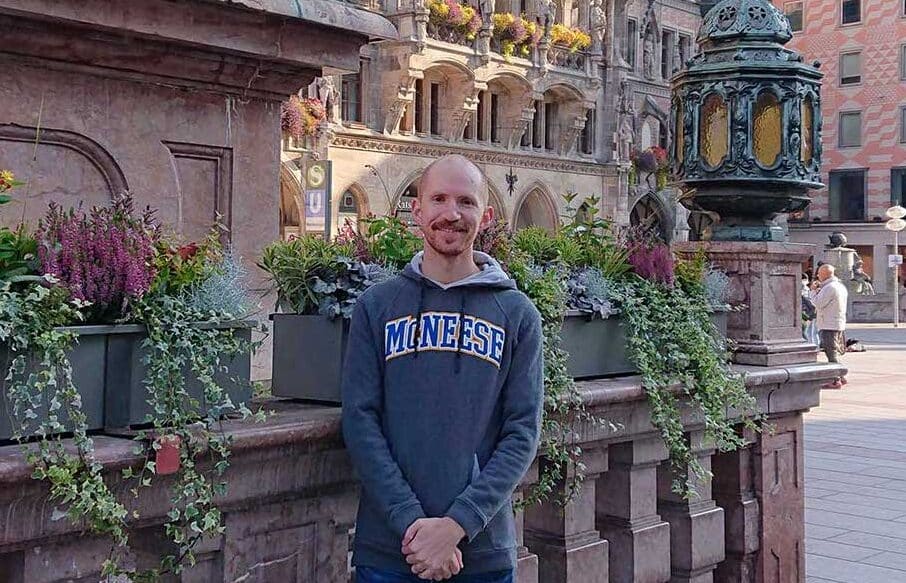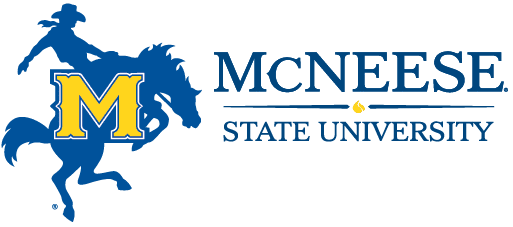McNeese Alumnus Studies Artificial Intelligence Abroad

2014 McNeese State University electrical engineering alumnus Daniel LeJeune is spending a semester abroad in Munich, Germany, as a guest doctoral candidate at the Technical University of Munich (TUM) studying artificial intelligence and machine learning.
LeJeune, who is originally from Jennings, came to McNeese as a first-generation university student.
“I was finishing up high school – I was homeschooled – and I definitely didn’t have the view of academia that I do now. But I did know I wanted to be an electrical engineer and I wanted to stay close to home,” he says. “I talked to my dad, and he said, ‘There’s the ULL and McNeese, they’re both really good, so pick whichever you like best.’”
Before he applied, LeJeune attended McNeese’s Engineers Week, which is held each spring and a day is set aside for high school students to visit and learn more about the engineering programs. He met with some of McNeese’s recruiters, who encouraged him to apply for Honors College based on his ACT scores. Honors College, LeJeune says, helped lay the groundwork for his future success.
“In Honors College, you have to do projects in eight of your courses that are above and beyond the requirements,” he says. “I chose to do them in my math and computer science courses. At the time, these projects just felt like having fun, but looking back, I really see those as valuable lessons in self-study and figuring out how to solve problems on my own, which is all I do now as a Ph.D. student.”
LeJeune says he originally attended McNeese with the intention of going to work in local industry, but former McNeese electrical engineering professor Dr. James Dennison encouraged him to continue pursuing academia.
“Towards the end of my junior year I wasn’t sure about graduate school – to be honest, it really wasn’t at the forefront of my mind,” he says. “But Dr. Dennison told me that if I didn’t go to graduate school, then I was wasting my potential. He told me to apply to the University of Michigan, which is exactly what I did.”
LeJeune went on to receive his master’s degree in electrical and computer engineering at the University of Michigan – Ann Arbor. After he graduated, he was hired at the Massachusetts Institute of Technology’s Lincoln Laboratory to apply machine learning to cyber security. But after a year on the job, LeJeune says he felt drawn to continue his education.
Now, he is a doctoral candidate in electrical and computer engineering at Rice University in Houston, Texas, where he specializes in research aimed at developing algorithms to solve machine learning and optimization problems and analyzing what makes successful algorithms perform well, a project that has led him to the collaboration at TUM.
“Designing AI systems these days is sort of like firing a cannon at a distant target,” he explains. “When cannons were first fired, people were just eyeballing the amount of powder and aiming and hoping they would hit the target, and if they didn’t, the cannons would be adjusted until they did. Because those using the cannons didn’t understand how conditions like the amount of powder and wind speed affected how the cannonball moved through the air, they had to start the trial-and-error process all over again when aiming at a new target.
“Now, with our understanding of Newtonian physics and chemistry, we have learned how to design the cannon system specifically to hit any target, so much so that we know that we will hit a target before we even fire. Similarly, we want to have theory for machine learning so that we know a system will work before we even try it. That’s what I’m working towards.”
LeJeune’s research has been published in the International Conference on Machine Learning, the Conference on Neural Information Processing Systems, the International Conference on Artificial Intelligence and Statistics, the Institute of Electrical and Electronics Engineers’ International Conference on Big Data and Smart Computing and the International Conference on Acoustics, Speech and Signal Processing.
Expecting to graduate in 2022, LeJeune says that he’s looking forward to continuing his education in a post-doctoral program and aims eventually to become a professor himself.
“McNeese was the steppingstone that helped me realize my potential as a researcher and an engineer,” says LeJeune. “When I started graduate school, I had some imposter syndrome and worried that coming from a smaller school that I wouldn’t be prepared in comparison to my peers. But my fears were completely groundless. What I found that matters most is you learn how to learn and that’s what I learned at McNeese. That skill will last me a lifetime.”
Want more stories like this one sent straight to your inbox every week? Sign up for our McNeese eNewsletter!
The Office of Marketing and Communications
4205 Ryan Street
Lake Charles, LA 70609
337-475-5640
communications@mcneese.edu

